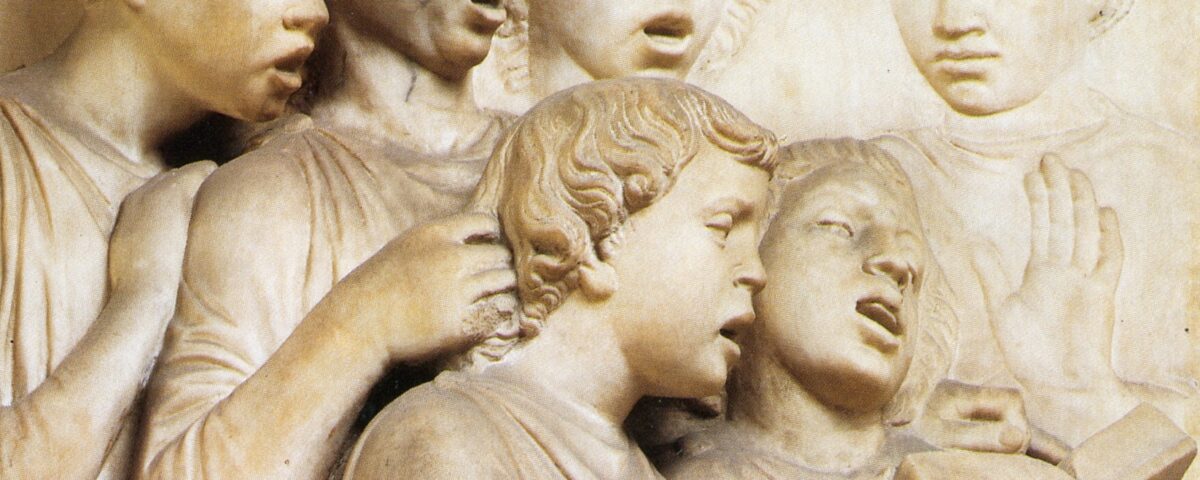Greetings to all in this very unique Summer! Since our return to public Mass, we have sung as we did before the pandemic (with the omission of some hymns, such as at Communion). This was a temporary move, and we remained open to fine-tuning it based on new information. We also remained committed to the use of hymns as a crucial way we embrace and proclaim the Gospel message in song. Now that we are learning more about how the virus spreads through the air (especially in crowds) and observing wise and charitable procedures in other places, we have discerned the need to make a change.
If you attend weekday Mass here (in person or via livestream), you know that the musical experience is simpler than on Sundays. The congregation only sings the unchanging parts of the Mass (Holy, We Proclaim Your Death, Amen, and Lamb of God), which are known as the “Ordinary.” As the ministers enter and again as the people come forward for Communion, the cantor sings an Entrance Chant and Communion Chant. These chants (together with the Scripture readings and Psalm), are known as the “Proper” of the Mass – since they change from day to day.
Out of an abundance of caution, and out of love and concern for all who attend worship here, Father Sullivan and I will extend this procedure to all public Masses beginning this weekend (July 11 and 12). The congregation is welcome (though absolutely not required) to sing the Ordinary (Glory to God, Holy, We Proclaim Your Death, Amen, and Lamb of God). Please leave your mask on to sing these parts of the Mass, and please sing only if you are comfortable doing so. The cantors and I will share the responsibility for singing the various Proper chants (including the Psalm and Alleluia as usual), while all listen and meditate. The Entrance and Communion chants are brief and thus perfect for the short processions that take place in our Activity Center. Their text will be found in your Missalette, and at the beginning of Mass, the lector will announce the page numbers.
An old Missal that I have (edited of course by wise Dominicans!) tells us that the Entrance Chant “signifies mystically the sighs of the ancient Patriarchs longing for the coming of the Messiah” and that the Communion Chant represents “the rejoicing of the people over the reception of the Sacred Mysteries.” Because of this, the Roman Missal envisions that it is possible and often more desirable to have Mass with just the Proper and Ordinary sung, and no other music added. This is certainly a return to the sources, but it also highlights a profound truth. Despite the fact that in “normal” times, our worship can be enriched by sights, sounds, and smells, Fr. John Hunwicke reminds us that “one of the characteristics of the Roman rite in all ages has been its unshowy matter-of-factness.” Perhaps we need some of that steady simplicity now, more than ever, as our focus shifts from so many external concerns to the reality of care for one another.
One day, we will resume singing hymns again – perhaps once again in our beautiful church, where as Thomas Gray wrote, the “pealing anthem swells the note of praise.” Your singing is a gift, and I am grateful for the repertoire that you have built, Sunday by Sunday. Until then, we can take comfort in the closeness of the great “choir” of witnesses that sings on our behalf – and perhaps reflect on this verse from one of our greatest hymns (“For All the Saints”):
And when the strife is fierce, the warfare long,
Steals on the ear the distant triumph song –
And hearts are brave again, and arms are strong.
Alleluia!
Peace,
Christopher
FURTHER READING:
From two other resources (they happen to be from the Archdiocese of Detroit, but find resonance everywhere):
- 1. Excerpt from a statement by the Archdiocesan Academy of Sacred Music:
“While ‘full and active participation by all the people is the aim to be considered before all else’ (Sacrosanctum Concilium #14) in preparing liturgical celebrations, exterior participation in sacred music has the potential to spread the coronavirus particularly vigorously. However, new research suggests that soft singing in masks transmits aerosols at a rate similarly to speaking in masks. Balancing the potential risks of singing with the spiritual hunger of the people of God to sing at Mass, the Academy advises that the congregation might join the sung dialogues with the clergy and in singing the ordinary of the Mass (Kyrie, Gloria, Sanctus, Agnus Dei). This singing should be through a mask and should be soft to prevent excessive aerosol transmission.”
- 2. Article on the use of different styles of “Antiphons” (Entrance Chant / Communion Chant):


